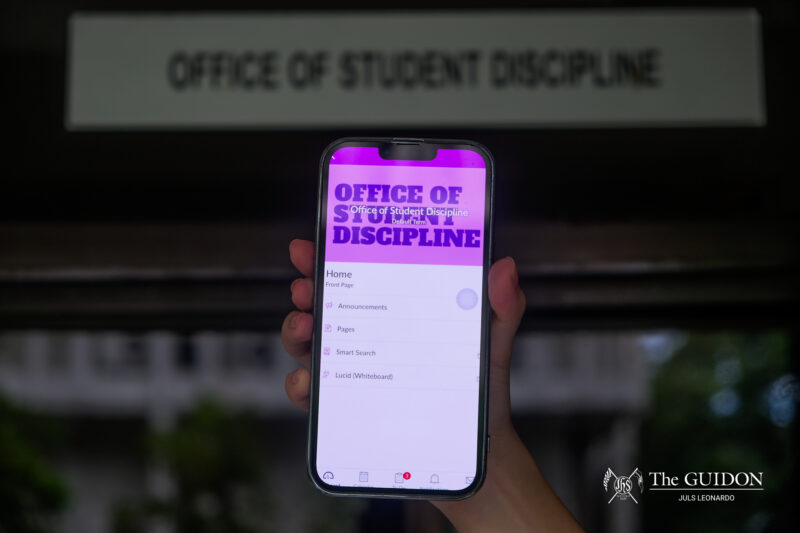FOLLOWING MULTIPLE reports of independent and unaccredited organizations facing difficulties regarding logistics, the Sanggunian School Representatives spearheaded efforts to conduct focus group discussions in order to gather more data regarding the issues of independent and non-accredited organizations.
They also offered technical, administrative, logistical, and financial assistance to their respective home organizations and student arms.
Initial meeting
School of Social Sciences (SOSS) Representative Christian Dy held the initial data-gathering meeting on January 30. School of Humanities (SOH) Representative Ferdy Acosta, Sanggunian Formator Rem Casiño, and other representatives from different non-accredited organizations attended the meeting.
The proposed plans by Dy and Casiño were discussed, mentioning that focus group discussions and data-gathering will start this month, and the new systems will be beta-tested next school year.
Casiño also introduced himself as the Coordinator for Emerging Organizations, a new term for organizations that do not have accreditation.
“It’s our job for everyone to be at least in our radar. Emerging means you’re either unaccredited or independent, whatever the needs that group has, we’d like to attend to,” Casiño said.
Among the proposed plans by the SOSS Sanggunian included the Resource Partnership Program, which allows organizations to acquire financial, logistical, and administrative resources from SOSS Sanggunian for aid in their projects. The organization as well as SOSS will be the co-owner of evaluation data of these projects.
Dy also mentioned his plan to institutionalize a Sanggunian office for independent organizations.
Casiño also encouraged emerging organizations to have strategic partnerships with accredited organizations, as well as the Sanggunian and their respective departments. He also said that they should engage with their school representatives so that their needs can be addressed.
Other concerns were raised by representatives from non-accredited organizations during the meeting, which included the lack of organization quarters, difficulties in finance sustainability as well as member formation, involvement, and sustainability.
In addition, they raised concerns regarding the current recruitment system, the lack of access to tarpaulins and posters and places where they may post them.
Casiño and Dy responded to these concerns with possible changes and additional services, such as leadership and member formation programs provided by the Office for Student Activities.
Casiño proposed a performance-based system for organizations. Dy also planned to have a master calendar for all organizations, a RecWeek manual for non-accredited organizations, and proposed collaboration with the Department of Student Welfare and Services.
Dy requested the emerging organizations to collate and make a comprehensive report of all their concerns so that they will have a strong case when the Sanggunian lobbies for these changes.
He also called for people to join the Sanggunian unit for emerging organizations. “There is value in us working together,” he said.
“Now we do have a voice, and it’s kind of empowering and scary, but it’s kind of exciting, because at least we have a say,” said ISDA President Annie Coronel.
Although absent at the meeting, School of Science and Engineering (SOSE) representative Neicy Pilarca released her own memo on January 31 with the same initiative towards addressing logistical concerns.
Pilarca said she sees the importance of attending to these problems due to it being a great means for organizations to manifest their advocacies.
“I believe that emerging organizations should be given better opportunities to bring forward their advocacies within the Ateneo. Us offering them administrative assistance and a safe place to voice out their grievances is just a small means of supporting them,” she said.
More than non-logistical
Aside from logistical concerns, the emerging organizations also reported internal problems to their respective school representatives.
According to Acosta, the emerging organizations in SOH also experience difficulties in acquiring funds for their projects and initiatives.
“Finance is another difficulty of emerging organizations. Given their accreditation status, emerging organizations receive no financial assistance from the school. We in the School of Humanities decided to share our resources in order to further empower these organizations,” he said.
Meanwhile, science-based emerging organizations are also experiencing concerns with leadership sustainability.
“[The science-based organizations] mentioned having difficulties in terms of leadership sustainability, as well as having problems with organization structure and internal procedures,” said Pilarca.
Proposed plans
In line with these concerns raised by the emerging organizations, Acosta and Pilarca have also proposed having focus group discussions in order to address more of their concerns continuously.
“The School of Humanities Sanggunian is initiating focus group discussions and individual consultations with different emerging organizations in order to hear their concerns and gather information about [their state],” said Acosta. “We want to identify the problems, collaborate to develop solutions, and enact policies that will address their concerns.”
On the other hand, Pilarca said that the SOSE Sanggunian is already in talks with prospective stakeholders to further extend aid.
“The SOSE Sanggunian has already started talking to possible stakeholders [such as] COA-STC [and] SOSE administration, that might be willing to collaborate with us in order to provide assistance to these emerging organizations,” she said.







